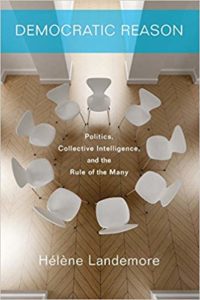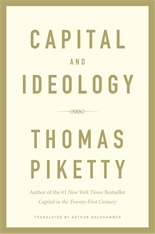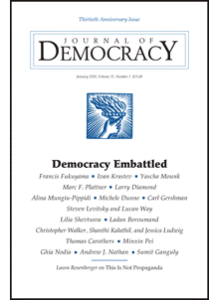 The scholar Hélène Landemore, a professor of political science at Yale, has spent much of her career trying to understand the value and meaning of democracy and trying to solve the problem of elected democratic representation—addressing flaws in a system that is widely believed to be no problem at all, The New Yorker reports:
The scholar Hélène Landemore, a professor of political science at Yale, has spent much of her career trying to understand the value and meaning of democracy and trying to solve the problem of elected democratic representation—addressing flaws in a system that is widely believed to be no problem at all, The New Yorker reports:
In her book “Democratic Reason: Politics, Collective Intelligence, and the Rule of the Many” (Princeton, 2012), she challenged the idea that leadership by the few was superior to leadership by the masses. Her forthcoming book, due out next year and currently titled “Open Democracy: Reinventing Popular Rule for the 21st Century,” envisions what true government by mass leadership could look like. Her model is based on the simple idea that, if government by the people is a goal, the people ought to do the governing.
A combination of war and progressive taxation led to dramatic falls in inequality over the first half of the 20th century, setting the stage for the social democratic regimes of the second half, Thomas Piketty argues in Capital and Ideology.
 The result of postwar trends is that western democracies are now dominated by two rival elites, reflected in many two-party electoral systems: a financial elite (or “merchant right”) that favours open markets, and an educational elite (or “Brahmin left”) that stands for cultural diversity, but has lost faith in progressive taxation as a basis for social justice, The Guardian’s William Davies writes. With these as the principal democratic options, nativist parties prosper, opposing educational and economic inequality, but only on the basis of tighter national borders. There is a vacancy for parties willing to defend internationalism and redistribution simultaneously.
The result of postwar trends is that western democracies are now dominated by two rival elites, reflected in many two-party electoral systems: a financial elite (or “merchant right”) that favours open markets, and an educational elite (or “Brahmin left”) that stands for cultural diversity, but has lost faith in progressive taxation as a basis for social justice, The Guardian’s William Davies writes. With these as the principal democratic options, nativist parties prosper, opposing educational and economic inequality, but only on the basis of tighter national borders. There is a vacancy for parties willing to defend internationalism and redistribution simultaneously.
Piketty’s goal to offer a new paradigm to substitute the largely obsolescent social-democratic project, notes Jean Pisani-Ferry, the Tommaso Padoa Schioppa chair of the European University Institute in Florence. If this ambition may seem excessive, it is rather fundamentally right, he writes for Bruegel, the European think tank:
In the current context of social anger, catalogs of down-to-earth policy proposals neither convince voters nor provide policymakers with a guide for real-time decision making in an unpredictable environment. Democracies nowadays need directions as ambitious as the welfare Keynesianism of the 1960s or the small government, free market project of the 1980s.
Capital and Ideology author Piketty debated how unfair societies can learn from their mistakes—and whether inequality is ever in the public interest—on the Economist podcast The Economist Asks.
But income inequality could be a good thing in the right circumstances and poverty in America is actually on the decline, Hoover Research Fellow David Henderson argues. Is income inequality actually increasing? What about poverty? More importantly, is all income inequality necessarily a bad thing? he asks in Income Inequality Isn’t The Problem.
 Stanford University’s Larry Diamond has launched Part I of his massive open online course on Comparative Democratic Development.
Stanford University’s Larry Diamond has launched Part I of his massive open online course on Comparative Democratic Development.
“Anyone anywhere in the world is welcome to take the course for free on the edX platform (however, a certificate of completion costs $50). This is an online version of the course I teach every other year to Stanford undergraduates,” adds Diamond, the co-chair of the Research Council of the International Forum for Democratic Studies of the National Endowment for Democracy. “The course aims for a broad international audience and does not require specific academic background. All  readings (mainly from the Journal of Democracy) are available for free online.”
readings (mainly from the Journal of Democracy) are available for free online.”
A panel discussion for the official launch of the Berggruen Institute’s latest report, “Renewing Democracy in the Digital Age” will focus on the philosophical frameworks and practical applications that policymakers and citizens alike can adopt and adapt in their national and local contexts to strengthen democracy.
Location: King’s College, Great Hall, Strand Campus, London, WC2R 2LS.
MARCH 2, 2020 Reception: 6:00 p.m. Program: 6:30 p.m. – 7:30 p.m. RSVP







